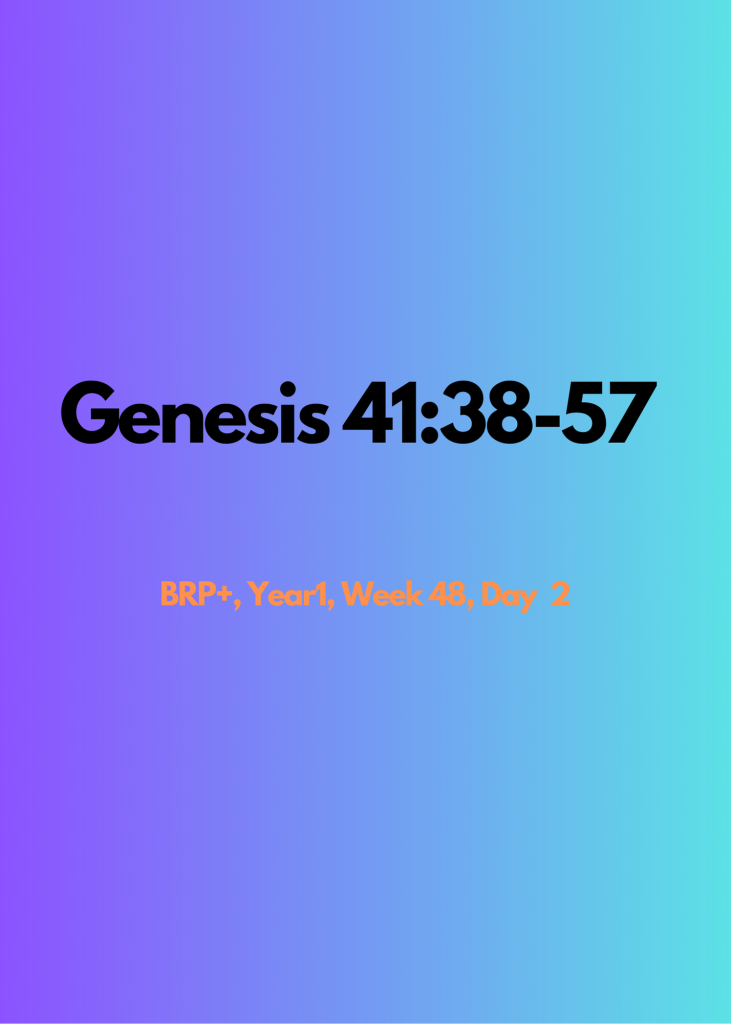Genesis 41:38-57
Q.1. Why did Pharaoh and his servants promote Joseph? How complete was his authority? What strategy did he employ as steward? (Gen.41:38-49)
At the beginning of the day, Joseph was a prisoner. By nightfall, he was the Prime Minister of Egypt, the greatest Empire up to that time. Pharaoh and his servants recognized God’s hand upon Joseph. Though this is not usually the normal thing in today’s world, Pharaoh had a sufficient fear of God, that he promoted Joseph who was at the prime of his life at just thirty years of age – You shall be over my house, and according to your command all my people shall do homage; only in the throne I will be greater than you … See, I have set you over all the land of Egypt … Though I am Pharaoh, yet without your permission no one shall raise his hand or foot in all the land of Egypt (Gen.41:40-41, 44, 46). Joseph gathered all the surplus grain into the cities – 48 he gathered all the food of these seven years which occurred in the land of Egypt and placed the food in the cities; he placed in every city the food from its own surrounding fields. 49 Thus Joseph stored up grain in great abundance like the sand of the sea, until he stopped measuring it, for it was beyond measure (Gen.41:48-49). Joseph must have been an impressive young man of God.
Q.2. What was special about his wife? When did they have children? What significance was attached to the names of their boys? (Gen.41:45, 50-52)
Pharaoh would certainly have chosen a highly desirable and suitable wife for Joseph. Because Joseph was a man of God, Pharaoh selected for him the daughter of the priest of On (see Gen.41:45). Their two sons were born – before the year of famine (Gen.41:50). Joseph gave them names that expressed God’s deliverance from his prior trials, as well as his fruitfulness in his newly adopted country – 51 Joseph named the firstborn Manasseh, “For,” he said, “God has made me forget all my trouble and all my father’s household.” 52 He named the second Ephraim, “For,” he said, “God has made me fruitful in the land of my affliction” (Gen.41:51-52).
Q.3. Was Joseph a true prophet? How did the famine affect Egypt and the surrounding nations? Why did he charge people for the grain they needed? (Gen.41:53-57)
True prophets of God are identified by the fulfilment of their prophecies. It was recorded that all came to pass – just as Joseph had said (Gen.41:54 c.f. Dt.18:18-22). The trials and triumphs of Joseph’s life picture those of the Lord Jesus. The severe seven years of drought affected all the surrounding nations – … but in all the land of Egypt there was bread… The people of all the earth came to Egypt to buy grain from Joseph, because the famine was severe in all the earth (Gen.41:54 & 57). Joseph had stored the excess grain during the years of plenty, and Pharaoh had given him complete control over its distribution (see Gen.41:48 c.f. 55). However, he did not simply give out the grain, knowing it could be wasted. He charged the Egyptian people as well as the foreigners, to ensure that the grain did not run out. Eventually the famine bankrupted the Egyptian people. At this time, Joseph instituted a taxation system that gave ownership of the land to Pharaoh (see Gen.47:20). The people trusted in Joseph and thanked him saying, – You have saved our lives! Let us find favour in the sight of my lord, and we will be Pharaoh’s slaves (Gen.47:25). God had blessed Joseph, so he could be a blessing to all the surrounding people.

